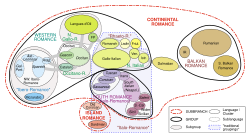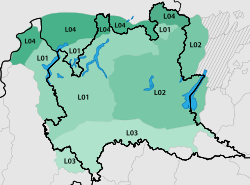Lombard language
(Redirected from Lombard (linguistics))
Lombard is a Gallo-Romance language,[5] in a linguistic continuum[6][7] it is spoken by millions of people in Northern Italy and Southern Switzerland, most of Lombardy and some areas of Piedmont and the western side of Trentino, and in Switzerland in the cantons of Ticino and Graubünden.[6] Lombard dialects are also heard in Santa Catarina in Brazil.[4][7]
| Lombard | ||||
|---|---|---|---|---|
| lombard / lumbart | ||||
| Native to | Italy, Switzerland | |||
| Region | Italy[1][2][3]
Brazil[4] | |||
| Native speakers | 3.8 million (2002)e18 | |||
| Language family | ||||
| Dialects | ||||
| Language codes | ||||
| ISO 639-3 | lmo | |||
| Linguasphere | 51-AAA-oc & 51-AAA-od | |||
| 300px | ||||
| 300px Detailed geographic distribution of Lombard dialects Legend: L01 – Western Lombard; L02 – Eastern Lombard; L03 – Southern Lombard; L04 – Alpine Lombard | ||||
| ||||
Lombard Language Media
Detailed geographic distribution of Lombard dialectsLegend: L01 – Western Lombard; L02 – Eastern Lombard; L03 – Southern Lombard; L04 – Alpine Lombard
A Lombard-speaker, recorded in Italy
References
- ↑ 1.0 1.1 Minahan, James (2000). One Europe, many nations: a historical dictionary of European national groups. Westport. ISBN 9780313309847.
- ↑ 2.0 2.1 Moseley, Christopher (2007). Encyclopedia of the world's endangered languages. New York.
- ↑ 3.0 3.1 Coluzzi, Paolo (2007). Minority language planning and micronationalism in Italy. Berne.
- ↑ 4.0 4.1 Spoken in Botuverá, in Brazil, municipality established by Italian migrants coming from the valley between Treviglio and Crema. A thesis of Leiden University about Brasilian Bergamasque: [1].
- ↑ "Documentation for ISO 639 identifier: LMO".
Identifier: LMO - Language(s) Name: Lombard - Status: Active - Code set: 639-3 - Scope: Individual - Type: Living
- ↑ 6.0 6.1 Jones, Mary C.; Soria, Claudia (2015). "Assessing the effect of official recognition on the vitality of endangered languages: a case of study from Italy". Policy and Planning for Endangered Languages. Cambridge, UK: Cambridge University Press. p. 130. ISBN 9781316352410.
Lombard (Lumbard, ISO 639-9 lmo) is a cluster of essentially homogeneous varieties (Tamburelli 2014: 9) belonging to the Gallo-Italic group. It is spoken in the Italian region of Lombardy, in the Novara province of Piedmont, and in Switzerland. Mutual intelligibility between speakers of Lombard and monolingual Italian speakers has been reported as very low (Tamburelli 2014). Although some Lombard varieties, Milanese in particular, enjoy a rather long and prestigious literary tradition, Lombard is now mostly used in informal domains. According to Ethnologue, Piedmontese and Lombard are spoken by between 1,600,000 and 2,000,000 speakers and around 3,500,000 speakers, respectively. These are very high figures for languages that have never been recognised officially nor systematically taught in school
- ↑ 7.0 7.1 Bonfadini, Giovanni. "lombardi, dialetti" [Lombard dialects]. Enciclopedia Treccani (in italiano).


